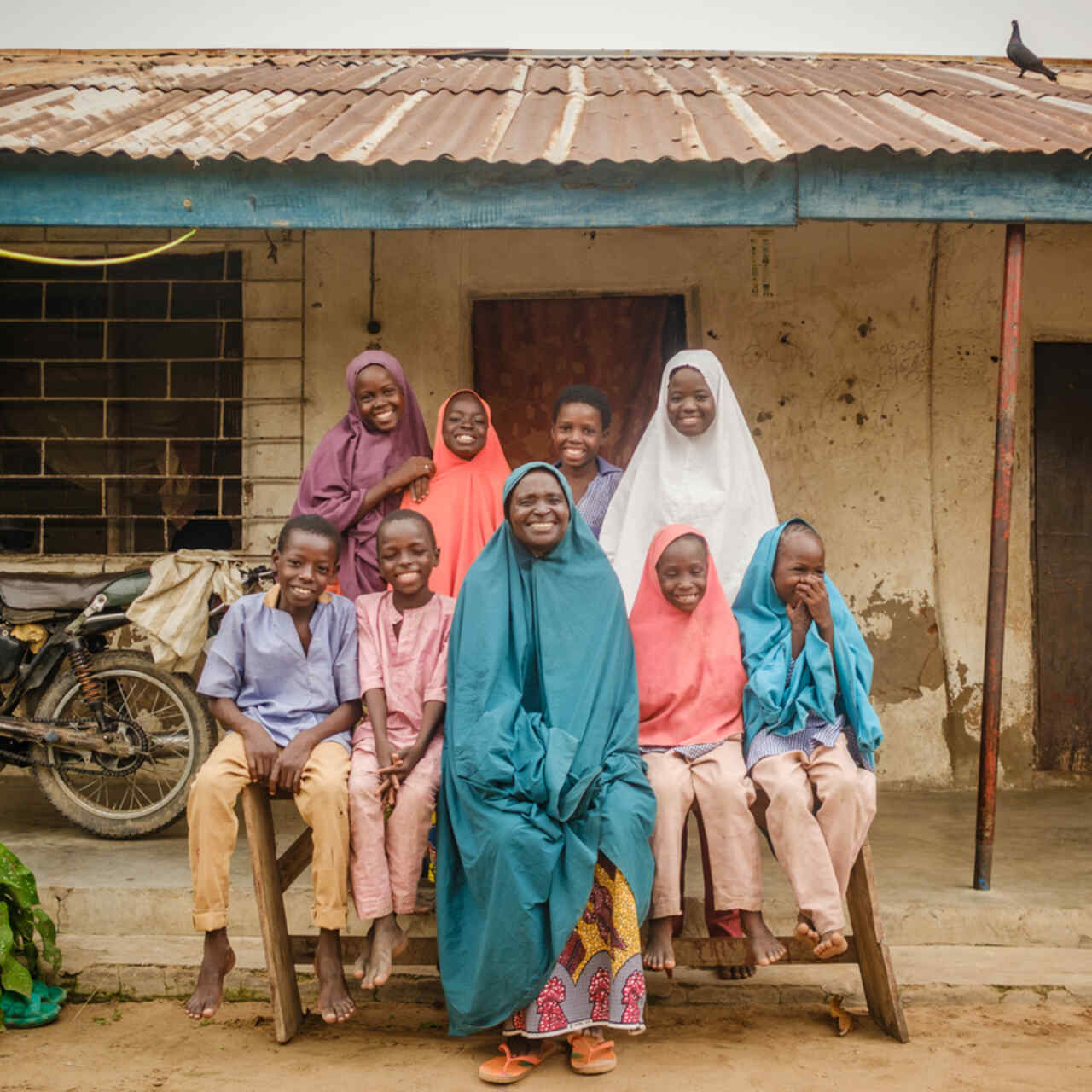
How the IRC is helping communities respond to the climate crisis
Learn how our teams are providing innovative solutions in the countries on the frontlines of climate change.

Learn how our teams are providing innovative solutions in the countries on the frontlines of climate change.
Did you know that nearly half of the population who are facing extreme poverty live in just 16 climate-vulnerable, conflict-affected countries? These nations are already struggling with the harsh realities of the climate crisis, with more frequent and intense natural disasters wreaking havoc on people’s lives.
People are losing their homes, incomes, and conflicts are intensified. These countries, however, are responsible for less than 3% of global greenhouse emissions. It is more necessary than ever for the world to take action on climate change. These countries, however, are responsible for less than 3% of global greenhouse emissions. It is more necessary than ever for the world to take action on climate change.
At the IRC, supporting vulnerable communities in the face of climate crises is one of our primary objectives. We work with a clear understanding of the specific needs of local communities and focus on climate adaptation, resilience, and crisis response. Below, gain an insight into our ongoing efforts to assist people around the world.
When we talk about climate resilience, we are referring to the ability of communities to recover from or mitigate the impact of climate-related events. This is especially challenging for poor or conflict-affected countries, where people may lack access to sufficient funds, infrastructure or information to cope with these crises effectively.
The IRC’s Re:BUiLD Programe which the IKEA Foundation supports, is working to develop skills and improve access to employment in climate-resilient jobs in textile and e-waste management in Kenya and Uganda. This initiative aims to empower young people and contribute to the increase in demand for and availability of green products and services in Kampala, Uganda and Nairobi, Kenya.
![Rahma [in orange] faces the camera, talking to a colleague.](/sites/default/files/styles/well_width_13x9_640px_wide/public/2023-11/20231508_Uganda_JSozi_WeldingApprenticeship---02391-1200x675-128554e.jpg?itok=du4UjZS8)
Rahma Nakazzi Nakato, 24, is one of the IRC’s Re:BUiLD clients placed for on-the-job learning at KenKat welding workshop located in Kampala, Uganda. Before the apprenticeship, Rahma had studied welding at the vocational institute but could not find a workshop. "Many workshops do not trust women to do the job,” she explains. After three months of the apprenticeship, Rahma is now employed full-time at KenKat.
The IRC works at local and national levels to help communities adapt to extreme weather. We promote climate-smart adaptation, community natural resource management, disaster risk reduction, agricultural solutions and early warning systems.
We are focusing on a new and promising area of climate innovation known as seed security. Our goal is to empower farmers to adapt to climate change by providing them with high-quality seeds that are resilient to its effects. Starting with a 12-month pilot in Syria, we are working directly with Syrian farmers to test and identify seeds most suitable to a changing climate.
Our project focuses on promoting women's participation in the agricultural sector, as well as multiplying and scaling the use of higher-yielding and climate-resilient seeds. We are currently expanding this project to Pakistan, Niger, and South Sudan in order to increase the efficiency and sustainability of farming practices in these regions.
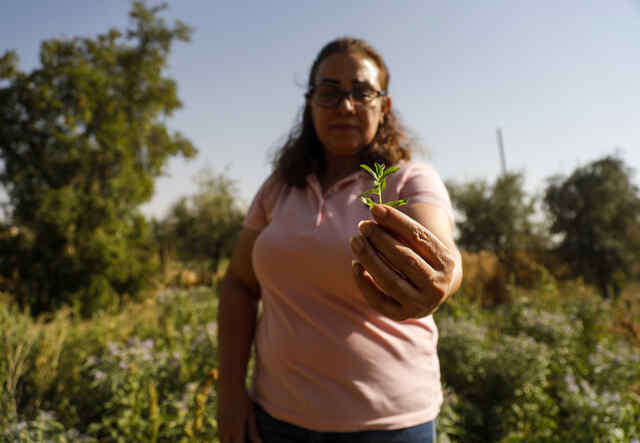
Climate shocks such as flooding and drought can shatter livelihoods and fuel insecurities, but anticipatory action - being informed about climate hazards and acting before an emergency - can significantly enhance communities' resilience and facilitate recovery.
Nigeria is extremely vulnerable to the impacts of climate change, experiencing a very high frequency of climate-related disasters. In 2012, the country witnessed one of the worst floods in a century, resulting in the displacement of over 2.3 million people, 363 deaths, and causing over 16 million people to lose their source of income.
The IRC has created a flood-risk monitoring platform for Nigeria's flood-prone northeastern region. The platform uses indigenous knowledge, hydrological and meteorological data, and satellite information to set forecast-based thresholds for triggering anticipatory cash payments.
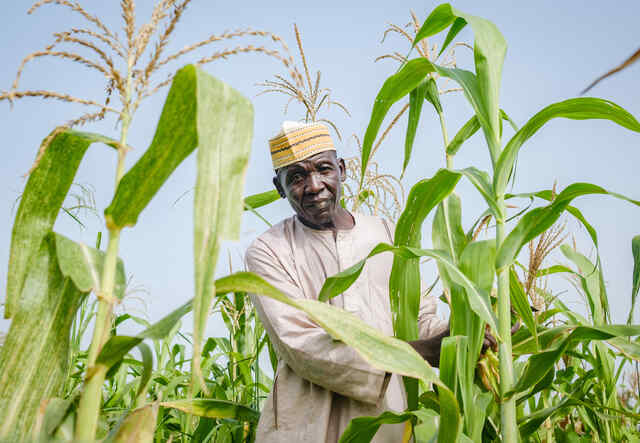
In the town of Dansina-Hausa, climate change has profoundly affected local farmers like 51-year-old Shaibu Mohammed. The corn farms he relied on to support his family and earn a living have been damaged due to increasingly frequent droughts and floods.
Recently, he’s started utilising the IRC's early warning messages to safeguard his farm before flooding hits and to assist others in his community in doing the same. Additionally, Mohammed received anticipatory cash to purchase a generator-driven water pump which allowed him to farm during droughts, and a motorcycle to travel to and from his farm more efficiently.
With climate disasters occurring more frequently, the IRC’s emergency teams are in over 50 countries around the world, ready to respond. These teams consist of professionals with various areas of expertise, including health, logistics, economic recovery, water and sanitation, children’s protection and sexual violence prevention, who are ready to take action.
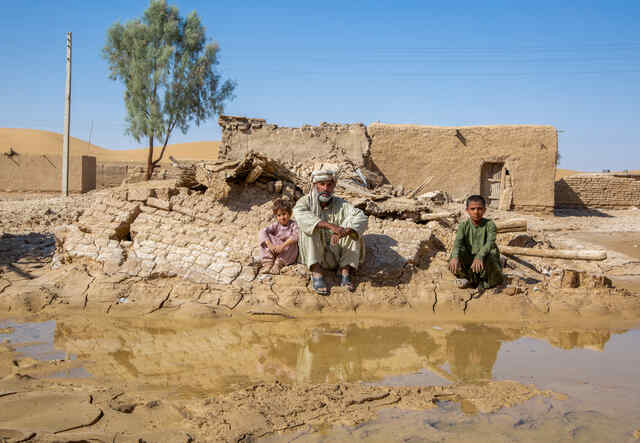
On 10 September 2023, unprecedented floods struck Libya when Mediterranean Storm Daniel made landfall, displacing over 40,000 people and sweeping away entire neighborhoods.
Years of conflict in Libya left vulnerable communities ill-prepared for climate events, with inadequate infrastructure and limited access to essential services. “It is often the most vulnerable people - at risk of their homes, livelihoods and health - who are on the frontlines of the climate crisis,” says IRC Libya country director Elie Abouaoun.
Since the onset of the crisis, our emergency teams have worked to provide health and protection services, as well as emergency items, to those in flood-affected areas. This included deploying mobile medical teams that have now reached over 5,600 affected people.
In conflict and crisis-affected regions, rural communities rely on farming and raising livestock for their livelihoods. However, sudden and gradual climate changes can disrupt their agricultural and pastoral activities, putting them at risk.
In East Africa, three years of catastrophic drought have been followed by devastating floods, affecting tens of millions and leading to unprecedented rates of acute malnutrition. Crisis-level food insecurity also threatens other areas, including Africa's Sahel region and Afghanistan.
For children, being malnourished can lead to a range of health problems and can be fatal. The IRC is leading the fight against child malnutrition and has developed a simplified and more cost-effective combined protocolthat offers a more comprehensive treatment.
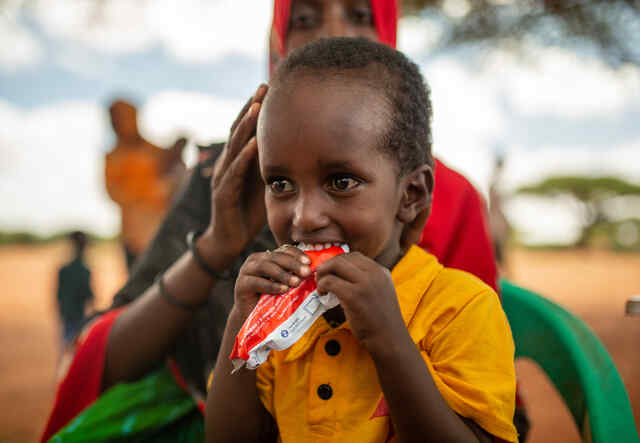
The simplified protocol empowers community health workers or parents in remote areas to assess and monitor children for malnutrition at home, enabling more children to be reached with life-saving care. The approach is already in action in the Central African Republic, Chad, Kenya, Mali, Nigeria, Somalia, and South Sudan.
“We are trying to reach mothers and children who are facing malnutrition so that we can provide them with health services and educational training,” says Agha, an IRC community healthcare worker in Afghanistan. “We want to raise awareness and guide them to care for their own health and prevent malnutrition in the future.”
Many refugees and immigrants arriving in the U.S. have agricultural backgrounds. The New Roots initiative has been helping these newcomers since 2008 by providing them with access to fresh produce, training, and resources.
This programme has enabled farmers in twelve cities across the U.S. to utilise their existing skills, navigate a new food system and grow fruits and vegetables. They also get opportunities to sell their produce at local markets, as they receive access to land, tools, and training.
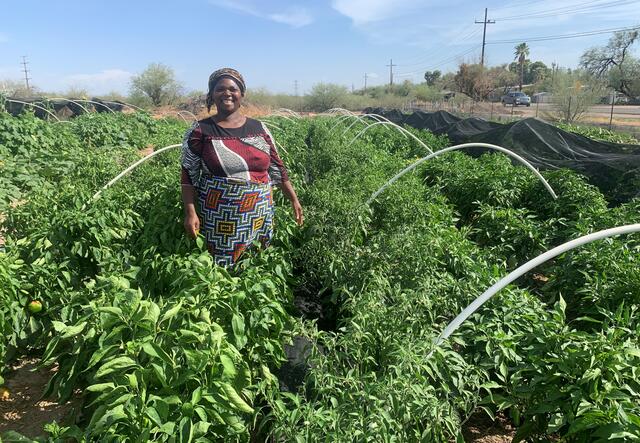
Egide and Anezi [pictured above] are farmers and refugees from Burundi. Egide and his family arrived in 2016, and Anezi and her family arrived in 2015. They now grow hot peppers and a variety of other produce at the IRC’s New Roots programme in Tucson, Arizona, and sell them at local farmer's markets. They have also partnered with a local restaurant, LaCo, to provide locally grown chillies for LaCo’s house-made hot sauces.
Climate change disproportionately affects women and girls, with many reliant on climate-sensitive jobs like farming. Extreme weather events often lead women to travel to far and unfamiliar areas, increasing their risk of facing gender-based violence. Economic impacts may push girls into early marriage and hinder education, while gender inequality limits women's access to essential resources for well-being and recovery.
From June to August in 2022, Pakistan received nearly 190% more rain than its 30-year average. The devastating flood water inundated approximately a third of the country, impacting millions.
The LIFE project, which is funded by the Australian Department for Foreign Affairs and Trade (DFAT) through its Water for Women programme, provides climate-resilient and gender-inclusive water, sanitation, and hygiene (WASH) services for more than 120,000 people residing in Peshawar, Swat and Buner districts of Khyber Pakhtunkhwa Province in Pakistan. Additionally, this initiative aims to empower women, girls, and marginalised groups to be more involved in decision-making regarding WASH.
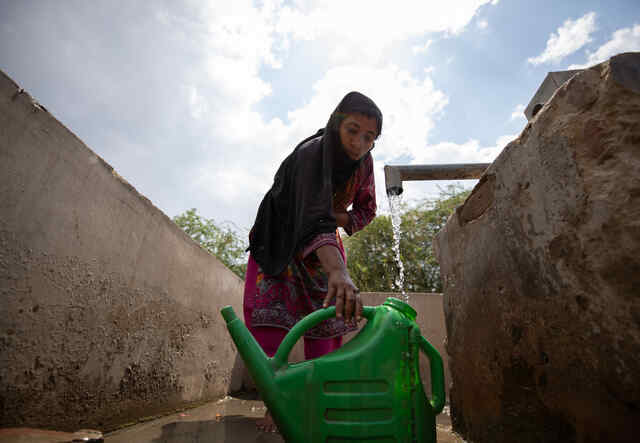
The IRC supports communities in adapting to climate change by identifying hazards, promoting sustainable livelihoods, and prioritising the needs of women and girls.
In addition, the ambitious IRC climate action plan has set us on a course to change how we work to reduce our carbon footprint. We have also committed to reaching net-zero greenhouse gas emissions by 2050.